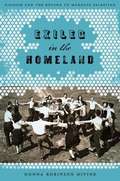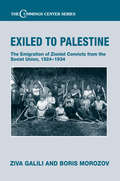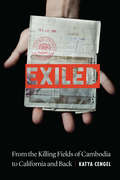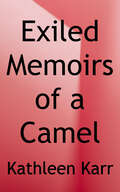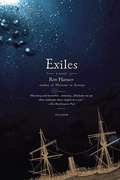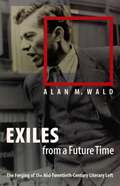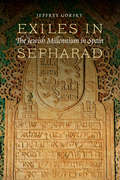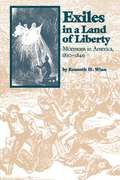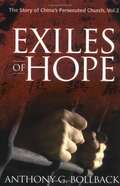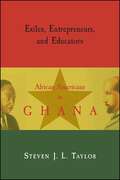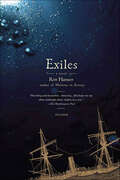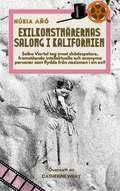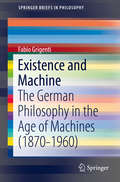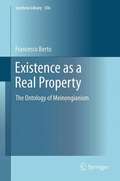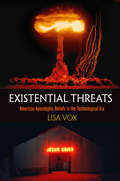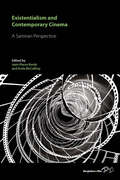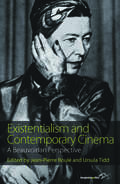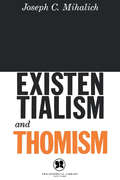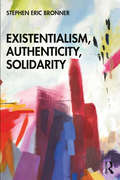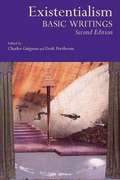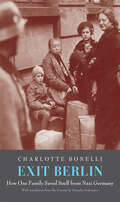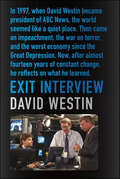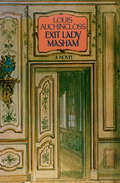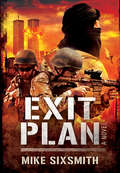- Table View
- List View
Exiled in the Homeland
by Donna Robinson DivineOffering a new perspective on Zionism, Exiled in the Homeland draws on memoirs, newspaper accounts, and archival material to examine closely the lives of the men and women who immigrated to Palestine in the early twentieth century. Rather than reducing these historic settlements to a single, unified theme, Donna Robinson Divine's research reveals an extraordinary spectrum of motivations and experiences among these populations. Though British rule and the yearning for a Jewish national home contributed to a foundation of solidarity, Exiled in the Homeland presents the many ways in which the message of emigration settled into the consciousness of the settlers. Considering the benefits and costs of their Zionist commitments, Divine explores a variety of motivations and outcomes, ranging from those newly arrived immigrants who harnessed their ambition for the goal of radical transformation to those who simply dreamed of living a better life. Also capturing the day-to-day experiences in families that faced scarce resources, as well as the British policies that shaped a variety of personal decisions on the part of the newcomers, Exiled in the Homeland provides new keys to understanding this pivotal chapter in Jewish history.
Exiled to Palestine: The Emigration of Soviet Zionist Convicts, 1924-1934 (Cummings Center Series #21)
by Ziva Galili Boris MorozovThis is the unknown story of how Zionists imprisoned by Soviet authorities were allowed to choose sentences of permanent departure to Palestine, where they helped build Jewish society, the backbone of left-wing parties, and the powerful trade union movement. These leading authors bring to light undiscovered documents from archives opened after the collapse of the Soviet Union and go on to revise fundamental assumptions about these events. They examine the means by which internal power struggles and personal interventions in the uppermost echelons of the Soviet leadership allowed the Zionists to disseminate their message and recruit thousands of members before the massive arrests of the mid-1920s; demonstrate the extent to which personal contacts between Zionists and those who aided them, Soviet leaders and members of the security services, were vital to initiating and sustaining the practice of substitution; and using a broad array of British and Zionist documents, they reveal the crucial role of Anglo-Zionist co-operation in facilitating the immigration of Zionist convicts. This book will of great interest to all students and scholars of Jewish and Israeli, Russian and Soviet and European and British history.
Exiled: From the Killing Fields of Cambodia to California and Back
by Katya CengelSan Tran Croucher&’s earliest memories are of fleeing ethnic attacks in her Vietnamese village, only to be later tortured in Cambodia by the Khmer Rouge. Katya Cengel met San when San was seventy-five years old and living in California, having miraculously survived the Cambodian genocide with her three daughters, Sithy, Sithea, and Jennifer. But San&’s family&’s troubles didn&’t end after their resettlement in California. As a teenager under the Khmer Rouge, San&’s daughter Sithy had been the family&’s savior, the strong one who learned how to steal food to keep them alive. In the United States, Sithy&’s survival skills were best suited for a life of crime, and she was eventually jailed for drug possession. U.S. immigration law enforces deportation of any immigrant or refugee who is found guilty of certain illegal activities, and San has hired a lawyer to fight Sithy&’s deportation case. Only time will tell if they are successful. In Exiled Cengel follows the stories of four Cambodian families, including San&’s, as they confront criminal deportation forty years after their resettlement in the United States. Weaving together these stories into a single narrative, Cengel finds that violence comes in many forms and that trauma is passed down through generations. With no easy answers, Cengel reveals a cycle of violence, followed by safety, and then loss.
Exiled: Memoirs of a Camel
by Kathleen KarrIn the nineteenth century, Ali the camel is separated from his mother in Egypt and sent to Texas, where he becomes part of the United States Camel Corps, but does not forget his longing for sand dunes and freedom.
Exiles
by Ron HansenIn December 1875 the steamship Deutschland left Bremen, Germany, bound for America. On board were five nuns, exiled by a ban on religious orders, bound to begin their lives anew in Missouri. Their journey would end when the Deutschland ran aground at the mouth of the Thames and all five drowned. Ron Hansen tells their harrowing story, but also that of the poet and seminarian Gerard Manly Hopkins, and how the shipwreck moved him to write a grand poem, a revelatory work read throughout the world today. Combining a thrilling tragedy at sea, with the seeming shipwreck of Hopkins's own life, "Hansen brilliantly, if soberly, weaves two interrelated story lines into a riveting novel" (BooklistonExiles).
Exiles from a Future Time
by Alan M. WaldWith this book, Alan Wald launches a bold and passionate account of the U.S. Literary Left from the 1920s through the 1960s. Exiles from a Future Time, the first volume of a trilogy, focuses on the forging of a Communist-led literary tradition in the 1930s. Exploring writers' intimate lives and heartfelt political commitments, Wald draws on original research in scores of archives and personal collections of papers; correspondence and interviews with hundreds of writers and their friends and families; and a treasure trove of unpublished memoirs, fiction, and poetry. In fashioning a "humanscape" of the Literary Left, Wald not only reassesses acclaimed authors but also returns to memory dozens of forgotten, talented writers. The authors range from the familiar Mike Gold, Langston Hughes, and Muriel Rukeyser to William Attaway, John Malcolm Brinnin, Stanley Burnshaw, Joy Davidman, Sol Funaroff, Joseph Freeman, Alfred Hayes, Eugene Clay Holmes, V. J. Jerome, Ruth Lechlitner, and Frances Winwar.Focusing on the formation of the tradition and the organization of the Cultural Left, Wald investigates the "elective affinity" of its avant-garde poets, the "Afro-cosmopolitanism" of its Black radical literary movement, and the uneasy negotiation between feminist concerns and class identity among its women writers.
Exiles in Sepharad: The Jewish Millennium in Spain
by Jeffrey GorskyThe dramatic one-thousand-year history of Jews in Spain comes to life in Exiles in Sepharad. Jeffrey Gorsky vividly relates this colorful period of Jewish history, from the era when Jewish culture was at its height in Muslim Spain to the horrors of the Inquisition and the Expulsion.Twenty percent of Jews today are descended from Sephardic Jews, who created significant works in religion, literature, science, and philosophy. They flourished under both Muslim and Christian rule, enjoying prosperity and power unsurpassed in Europe. Their cultural contributions include important poets; the great Jewish philosopher Moses Maimonides; and Moses de Leon, author of the Zohar, the core text of the Kabbalah.But these Jews also endured considerable hardship. Fundamentalist Islamic tribes drove them from Muslim to Christian Spain. In 1391 thousands were killed and more than a third were forced to convert by anti-Jewish rioters. A century later the Spanish Inquisition began, accusing thousands of these converts of heresy. By the end of the fifteenth century Jews had been expelled from Spain and forcibly converted in Portugal and Navarre. After almost a millennium of harmonious existence, what had been the most populous and prosperous Jewish community in Europe ceased to exist on the Iberian Peninsula.
Exiles in a Land of Liberty
by Kenneth H. WinnUsing the concept of "classical republicanism" in his analysis, Kenneth Winn argues against the common view that the Mormon religion was an exceptional phenomenon representing a countercultural ideology fundamentally subversive to American society. Rather, he maintains, both the Saints and their enemies affirmed republican principles, but in radically different ways.Winn identifies the 1830 founding of the Mormon church as a religious protest against the pervasive disorder plaguing antebellum America, attracting people who saw the libertarianism, religious pluralism, and market capitalism of Jacksonian America as threats to the Republic. While non-Mormons shared the perception that the Union was in danger, many saw the Mormons as one of the chief threats. General fear of Joseph Smith and his followers led to verbal and physical attacks on the Saints, which reinforced the Mormons' conviction that America had descended into anarchy. By 1846, violent opposition had driven Mormons to the uninhabited Great Salt Lake Basin.
Exiles of Hope: The Story of China's Persecuted Church, Vol. 2
by Anthony G. BollbackThis personalized story of China's persecuted church will startle, grip and convict your heart as it has mine. Dr. Edwin W. Kilbourne Vice President-at-Large, OMS International. Exiles of Hope expresses the bold and resolved witness of China's Christians. The characters challenge the reader to exchange temporal, earthly comforts for eternal, heavenly glory as they risk imprisonment and torture to tell others about Jesus Christ. Dr. Tom White Director of The Voice of the Martyrs - USA The Acts of the Holy Spirit continue as Jesus builds His church in China. Anthony Bollback has captured that in this moving sequel to Red Runs the River, which will result in greater praise to God, prayers for the Chinese believers, and inspiration for the reader. Dr. David E. Schroeder President, Nyack Collage / Alliance Theological Seminary. Enthusiastically I am delighted to endorse Exiles of Hope, authored by veteran missionary Anthony Bollback. This is a unique volume describing the sufferings- and victories of fellow believers in China. Ben Armstrong, Ph.D. Former founding director, Trans World Radio and Executive director National Religious Broadcasters, NRB. Exiles of Hope is a most welcome addition to the first volume on The Story of China's Persecuted Church. Anthony Bollback vividly and sensitively captures the reality of this phenomenal movement of the Holy Spirit. Dr. Rexford A. Boda, Past President of Canadian Bible College / Canadian Theological Seminary Nyack College / Alliance Theology Seminary.
Exiles, Entrepreneurs, and Educators: African Americans in Ghana (SUNY series in African American Studies)
by Steven J. TaylorAfter repeated coups and periods of military rule, Ghana is now one of Africa's longest enduring democratic republics. Exiles, Entrepreneurs, and Educators compares the political proclivities of two generations of African Americans who moved to Ghana. Steven J. L. Taylor blends archival and ethnographic research, including interviews, to provide a unique perspective on these immigrants who chose to leave an economically developed country and settle in an impoverished developing country. The first generation consisted of voluntary exiles from the US who arrived from 1957 to 1966, during the regime of President Kwame Nkrumah, and embraced both Nkrumah and his left-leaning political party. In contrast to the first generation, many in the second generation left the US to establish commercial enterprises in Ghana. Although they identified with the Democratic Party while living in the US, and were politically active, they avoided political activity in Ghana and many identified with the Ghanaian party that is modeled after the Republican Party in the US. Taylor dispels some of the incorrect assumptions about African politics and provides readers with an insightful look at how developing nations can embark upon a path toward democratization.
Exiles: A Novel
by Ron HansenWith Exiles, Ron Hansen tells the story of a notorious shipwreck that prompted Gerard Manley Hopkins to break years of "elected silence" with an outpouring of dazzling poetry. In December 1875 the steamship Deutschland left Bremen, bound for England and then America. On board were five young nuns who, exiled by Bismarck's laws against Catholic religious orders, were going to begin their lives anew in Missouri. Early one morning, the ship ran aground in the Thames and more than sixty lives were lost—including those of the five nuns. Hopkins was a Jesuit seminarian in Wales, and he was so moved by the news of the shipwreck that he wrote a grand poem about it, his first serious work since abandoning a literary career at Oxford to become a priest. He too would die young, an exile from the literary world. But as Hansen's gorgeously written account of Hopkins's life makes clear, he fulfilled his calling. Combining a thrilling tragedy at sea with the seeming shipwreck of Hopkins's own life, Exiles joins Hansen's Mariette in Ecstasy (called "an astonishingly deft and provocative novel" by The New York Times) as a novel that dramatizes the passionate inner search of religious life and makes it accessible to us in the way that only great art can.
Exilkonstnärernas salong i Kalifornien: Salka Viertel tog emot skådespelare och intellektuella som flydde från nazismen i sin exil
by Núria Añó"Exilkonstnärernas salong i Kalifornien" är en biografi om Salka Viertel, en judisk skådespelerska som emigrerade till Hollywood och blev populärt känd som manusförfattaren till den svenska skådespelerskan Greta Garbo. Dessutom hade hon en salong i Santa Monica, Kalifornien, där en stor del av den europeiska exilintelligentsian samlades. Salka var en mycket modern och intressant kvinna för sin tid, och hon förtjänar att bli känd som hon verkligen är värd. I boken behandlas ämnen som den påstådda bisexualiteten hos Salka Viertel och de många erkända vänner hon hade, såsom Albert Einstein, Charles Chaplin, Sergei Eisenstein, F. W. Murnau, Max Reinhardt, Arnold Schönberg, Thomas Mann, Bertolt Brecht, Greta Garbo, Montgomery Clift, för att nämna några. Liksom Gertrude Stein och andra framstående kvinnor hade hon dessutom sin egen litterära salong, där författare som Truman Capote, Christopher Isherwood, Gore Vidal och många fler deltog. Andra ämnen som tas upp är Berlin på 1920-talet; övergången från stumfilm till ljudfilm, sett från filmens mecka, Hollywood. Sedan Hitlers uppgång och vad det innebar för den judiska situationen; exilen för de intellektuella som inte kunde återvända till sina respektive länder på grund av andra världskriget. Senare, kalla kriget och häxjakten mot kommunismen. Faktum är att Salka Viertels liv och hennes vänners krets berör de stora händelserna under 1900-talet. För detta projekt erhöll författaren stipendier från Shanghai Writing Program (Kina, 2016) och Baltic Centre (Sverige, 2017). "Trots att Salka Viertel var en så central gestalt i exilsamhället, har det skrivits väldigt lite om henne, vilket gör Núria Añós bok till ett korrektiv, och hon fyller många av luckorna i Främlingarna på Mabery Road." —Dialog International "En mycket intressant berättelse och jag tycker fortfarande att den är mycket aktuell, eftersom vi enligt min mening inte har ko
Existence and Machine
by Fabio GrigentiThe aim of this work is to provide a preliminary analysis of a much more far-reaching investigation into the relationship between technology and philosophy. In the context of the contemporary German thought, the author compares the different positions of Karl Marx, Martin Heidegger, Ernst and Friedrich Junger, Arnold Gehlen and Gunther Anders. The term machine is used precisely to mean that complex material device assembled in the last quarter of the 18th century as a result of the definitive modern refinement of certain fundamental technologies, i. e. metallurgy, precision mechanics and hydraulics. The machine discussed here arrived on the scene of man s history when the processes of spinning and weaving were entrusted to semi-automatic means; when the water wheels used in mills, hitherto always made of wood, were supplanted by the metal levers of the steam engine; and especially when the steam engine was connected to the weaving frames, to the metalworking hammers, and to other machines used to manufacture other machines in an endless reiteration of assemblies and applications, the enormous outcome of which is what subsequently came to be described as mass production . The philosophers discussed here were also dealing with the type of machine described above and in their works she we can identify three model images of this idea of machine. These images have been drawn on at various times, also outside the realms of philosophy, and they still provide the backdrop for our knowledge of the machine, which has circulated in a great variety of languages. "
Existence as a Real Property
by Francesco BertoThis profound exploration of one of the core notions of philosophy--the concept of existence itself--reviews, then counters (via Meinongian theory), the mainstream philosophical view running from Hume to Frege, Russell, and Quine, summarized thus by Kant: "Existence is not a predicate." The initial section of the book presents a comprehensive introduction to, and critical evaluation of, this mainstream view. The author moves on to provide the first systematic survey of all the main Meinongian theories of existence, which, by contrast, reckon existence to be a real, full-fledged property of objects that some things possess, and others lack. As an influential addition to the research literature, the third part develops the most up-to-date neo-Meinongian theory called Modal Meinongianism, applies it to specific fields such as the ontology of fictional objects, and discusses its open problems, laying the groundwork for further research. In accordance with the latest trends in analytic ontology, the author prioritizes a meta-ontological viewpoint, adopting a dual definition of meta-ontology as the discourse on the meaning of being, and as the discourse on the tools and methods of ontological enquiry. This allows a balanced assessment of philosophical views on a cost-benefit basis, following multiple criteria for theory evaluation. Compelling and revealing, this new publication is a vital addition to contemporary philosophical ontology.
Existence as a Real Property: The Ontology of Meinongianism (Synthese Library #356)
by Francesco BertoThis profound exploration of one of the core notions of philosophy—the concept of existence itself—reviews, then counters (via Meinongian theory), the mainstream philosophical view running from Hume to Frege, Russell, and Quine, summarized thus by Kant: “Existence is not a predicate.” The initial section of the book presents a comprehensive introduction to, and critical evaluation of, this mainstream view. The author moves on to provide the first systematic survey of all the main Meinongian theories of existence, which, by contrast, reckon existence to be a real, full-fledged property of objects that some things possess, and others lack. As an influential addition to the research literature, the third part develops the most up-to-date neo-Meinongian theory called Modal Meinongianism, applies it to specific fields such as the ontology of fictional objects, and discusses its open problems, laying the groundwork for further research.In accordance with the latest trends in analytic ontology, the author prioritizes a meta-ontological viewpoint, adopting a dual definition of meta-ontology as the discourse on the meaning of being, and as the discourse on the tools and methods of ontological enquiry. This allows a balanced assessment of philosophical views on a cost-benefit basis, following multiple criteria for theory evaluation. Compelling and revealing, this new publication is a vital addition to contemporary philosophical ontology.
Existential Threats: American Apocalyptic Beliefs in the Technological Era
by Lisa VoxAmericans have long been enthralled by visions of the apocalypse. Will the world end through nuclear war, environmental degradation, and declining biodiversity? Or, perhaps, through the second coming of Christ, rapture of the faithful, and arrival of the Antichrist—a set of beliefs known as dispensationalist premillennialism? These seemingly competing apocalyptic fantasies are not as dissimilar as we might think. In fact, Lisa Vox argues, although these secular and religious visions of the end of the world developed independently, they have converged to create the landscape of our current apocalyptic imagination.In Existential Threats, Vox assembles a wide range of media—science fiction movies, biblical tractates, rapture fiction—to develop a critical history of the apocalyptic imagination from the late 1800s to the present. Apocalypticism was once solely a religious ideology, Vox contends, which has secularized in response to increasing technological and political threats to American safety. Vox reads texts ranging from Christianity Today articles on ecology and the atomic bomb to Dr. Strangelove, and from Mary Shelley's The Last Man to the Left Behind series by Tim LaHaye and Jerry B. Jenkins, demonstrating along the way that conservative evangelicals have not been as resistant to science as popularly believed and that scientists and science writers have unwittingly reproduced evangelical eschatological themes and scenarios in their own works. Existential Threats argues that American apocalypticism reflects and propagates our ongoing debates over the authority of science, the place of religion, uses of technology, and America's evolving role in global politics.
Existentialism And Contemporary Cinema
by Enda Mccaffrey Jean-Pierre BoulaAt the heart of this volume is the assertion that Sartrean existentialism, most prominent in the 1940s, particularly in France, is still relevant as a way of interpreting the world today. Film, by reflecting philosophical concerns in the actions and choices of characters, continues and extends a tradition in which art exemplifies the understanding of existentialist philosophy. In a scholarly yet accessible style, the contributors exploit the rich interplay between Sartre's philosophy, plays and novels, and a number of contemporary films including No Country for Old Men, Lost in Translation and The Truman Show, with film-makers including the Dardenne brothers, Michael Haneke, and Mike Leigh. This volume will be of interest to students who are coming to Sartre's work for the first time and to those who would like to read films within an existentialist perspective.
Existentialism and Contemporary Cinema
by Ursula Tidd Jean-Pierre BouleSimone de Beauvoir's work has not often been associated with film studies, which appears paradoxical when it is recognized that she was the first feminist thinker to inaugurate the concept of the gendered 'othering' gaze. This book is an attempt to redress this balance and reopen the dialogue between Beauvoir's writings and film studies. The authors analyse a range of films, from directors including Claire Denis, Michael Haneke, Lucille Hadzihalilovic, Sam Mendes, and Sally Potter, by drawing from Beauvoir's key works such as The Second Sex (1949), The Ethics of Ambiguity (1947) and Old Age (1970).
Existentialism and Thomism
by Joseph C. MihalichPhilosopher Joseph C. Mihalich introduces readers to the famous philosophical movements in his short guide Existentialism and Thomism. Written with a general audience in mind, readers of Mihalich's accessible prose will build the groundwork of their knowledge in these twentieth century political ideologies. Joseph C. Mihalich was an American philosopher and author who specialized in bringing philosophy to a wider audience. In addition to Existentialism and Thomism, he wrote Sports and Athletics: Philosophy in Action.
Existentialism, Authenticity, Solidarity
by Stephen Eric BronnerWhat makes individuals what they are? How should they judge their social and political interaction with the world? What makes them authentic or inauthentic? This original and provocative study explores the concept of "authenticity" and its relevance for radical politics. Weaving together close readings of three 20th century thinkers: Martin Heidegger, Karl Jaspers and Jean-Paul Sartre with the concept of authenticity, Stephen Eric Bronner illuminates the phenomenological foundations for self-awareness that underpin our sense of identity and solidarity. He claims that different expressions of the existential tradition compete with one another in determining how authenticity might be experienced, but all of them ultimately rest on self-referential judgments. The author’s own new framework for a political ethic at once serves as a corrective and an alternative. Wonderfully rich, insightful, and nuanced, Stephen Eric Bronner has produced another bookshelf staple that speaks to crucial issues in politics, philosophy, psychology, and sociology. Existentialism, Authenticity, Solidarity will appeal to scholars, students and readers from the general public alike.
Existentialism: Basic Writings
by Charles B. Guignon Derk PereboomThis book offers a brief introduction to the thought of four figures central to existential philosophy--Kierkegaard, Nietzsche, Heidegger, and Sartre. An introductory chapter presents the basic perspective and concerns of existentialism, and describes its place in the history of philosophy. Similar introductions are provided for each of the four philosophers, followed by selections from their major works. Background readings are also excerpted from works by Hegel and Husserl. No index. c. Book News Inc.
Exit Berlin: How One Woman Saved Her Family from Nazi Germany
by Charlotte R. BonelliCentered around one family&’s preserved personal letters, this is &“an intimate, engaging examination of the plight of German Jewish refugees&” (Kirkus Reviews). Just a week after the Kristallnacht terror in 1938, young Luzie Hatch, a German Jew, fled Berlin to resettle in New York. Her rescuer was an American-born cousin and industrialist, Arnold Hatch. Arnold spoke no German, so Luzie quickly became translator, intermediary, and advocate for family left behind. Soon an unending stream of desperate requests from German relatives made their way to Arnold&’s desk. Luzie Hatch faithfully preserved her letters both to and from far-flung relatives during the World War II era as well as copies of letters written on their behalf. This extraordinary collection, now housed at the American Jewish Committee Archives, serves as the framework for Exit Berlin. Charlotte R. Bonelli offers a vantage point rich with historical context, from biographical information about the correspondents to background on U.S. immigration laws, conditions at the Vichy internment camps, refuge in Shanghai, and many other topics, thus transforming the letters into a riveting narrative. Arnold&’s letters also reveal an unfamiliar side of Holocaust history. His are the responses of an &“average&” American Jew, struggling to keep his own business afloat while also assisting dozens of relatives trapped abroad—most of whom he&’d never met and whose situation he could not fully comprehend. This book contributes importantly to historical understanding while also uncovering the dramatic story of one besieged family confronting unimaginable evil. &“Has as much to teach readers about today&’s world, which is filled with war and displacement, as it does about the world of the 1930s.&” —Kirkus Reviews &“For a generation steeped in email, this heartrending collection of letters takes us to a more intimately communicative era―in which Jews, trapped in the nightmare of Hitler&’s persecution, pleaded for help to escape to their cousins in America; and in which the latter tried desperately, generously, to respond.&” —Michael R. Marrus, author of The Holocaust in History
Exit Interview
by David WestinWhen David Westin became president of ABC News in March 1997, the division was treading water. "It looked like all the really important news was behind us," he writes. Hardly. For the next thirteen years, Westin would preside over ABC News during some of the most important and perplexing events in its history:• President Clinton's impeachment• The tied 2000 presidential election• The 9/11 attacks• Conflicts in Iraq and Afghanistan• The swift boat smear campaign against Senator John KerryExit Interview is a behind-the-scenes look at Westin's tenure and the major news that marked it. He takes us inside the chaos of the newsroom—alongside major players such as Peter Jennings, Barbara Walters, Diane Sawyer, and Bob Woodruff—where what looks clear and certain from the outside is often mired in conflict and urgency. Neither an apologia nor a critique, the book charts the ups and downs of fourteen formative years in network news, addressing basic questions about how our news is reported, from the point of view of someone who was there. With milestones from the recent past, Westin explores the uncertainty inherent in his job, and its central question: Is it possible for journalists to be both good at their jobs and people of good moral character?
Exit Lady Masham: A Novel
by Louis AuchinclossIn this witty historical novel by the author of Watchfires, a poor woman joins the eighteenth-century court of Queen Anne and ends a war.On the Continent, John Churchill, Duke of Marlborough, is laying waste to the lowlands in a bloody combat with Louis XIV. Meanwhile at the British court, Queen Anne, aging, ill, and surrounded by sycophants, is coping with the intrigues of those who wish to promote Marlborough’s dangerous ambitions. Chief among the plotters is his headstrong wife (and court favorite), Sarah Churchill.Into this tense and steamy environment comes young Abigail Hill, Sarah’s impoverished cousin. Sarah has arranged for her to be a maid to the Queen. But Abigail will discover that she has been marked by destiny for a special mission, which is nothing less than to bring to a halt a destructive world war. How she accomplishes this is the subject of this unusual but historically justified tale . . .The drama of court life and high politics, the growing antagonism between Sarah and Abigail, and an engaging cast of characters make for a lively narrative. And the portrait of Queen Anne is a tour de force that lends further depth to this vivid and engaging book.Perfect for fans of the Yorgos Lanthimos film, The Favourite, starring Olivia Coleman and Emma Stone.
Exit Plan: A Novel
by Mike SixsmithBill Sloan, a former British Army intelligence officer and Shahid Al Sheehi, the son of a Pakistani British immigrant are caught up in a breathtakingly ambitious plan for a small Middle Eastern Emirate to seize regional power by acquiring weapons of mass destruction. The destinies of Sloan and Al Sheehi are irrevocably entwined.This novel draws the reader into a realm of political intrigue, characterized by thwarted terrorist plots, international duplicity, and a host of anxious preoccupations including the threat of WMDs. Incredibly timely, as these issues still continue to feature in contemporary headlines, this work acts to set our current perceptions of such issues is context.Well-developed characters populate the pages, living very different lives but influenced by similar factors; a writer in command of his subject matter details their parallel agendas and overlapping imperatives with ease. Informed by his own personal experiences, this novel has a real feel of authenticity, offering an unrivalled insight into the Middle Eastern tensions, which have simmered over the past thirty years, and seeking to illuminate the paradoxes and oppositions of lives ensnared in such realities.
